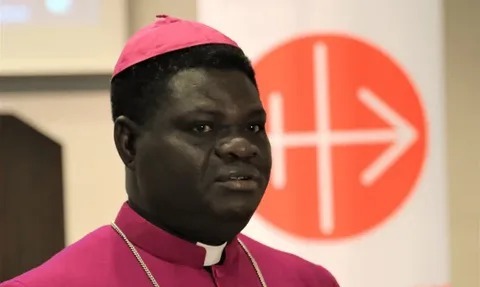The full video of Bishop Wilfred Chikpa Anagbe of the Catholic Diocese of Makurdi, Benue State, who on February 14, 2024 briefed the United States House Foreign Affairs Subcommittee on Africa on the alleged genocidal persecution of Christians in Nigeria’s Middle Belt, particularly Benue State, has emerged.
The Eagle Online recalls that based on such reports, President Donald Trump has redesignated Nigeria a Country of Particular Concern.
In the footage seen by The Eagle Online, the Bishop, accompanied by Reverend Father Remigius Ihyula, detailed alleged systematic massacres by ethnic Fulani jihadists against Christian farming communities, including kidnappings, church burnings, and land seizures.
Anagbe testified on the atrocities allegedly perpetrated against Christians in Nigeria, the Middle Belt Region, and Benue State in particular.
He detailed the persecution of Christians, especially in the Northern and Central regions of Nigeria, where he said there is an agenda “to reduce and eventually eliminate the Christian identity” of the country.
The Bishop has been vocal about what he described as a genocide targeting Christians in Nigeria amid closure of Catholic Parishes across his Episcopal See and multiple displacements owing to heightened activities of Islamist Fulani herdsmen.
He told the US House Foreign Affairs Committee that designating Nigeria as a CPC will ensure that the Nigerian government accounts for the situation of Christians in the country.
He also recounted the situation in northern Nigeria that is witnessing an increasing number of kidnappings of Catholic priests for reasons he said were other than ransom, as well as the forceful closure of all schools in some parts of the region, including Catholic institutions, for the whole period of Ramadan.
The Bishop of Makurdi highlighted the need to ensure that people who have been displaced by terrorists across the country are allowed back to their ancestral homes, instead of the government resettling them elsewhere while Islamists occupy their ancestral lands.
Anagbe said: “Concretely, I request and I plead, I ask you to redesignate Nigeria as a country of particular concern.
“This has both a practical and diplomatic meaning, to signal that you are paying attention to what happens to us and elsewhere in the world.”
He observed that policies that the Nigerian government is trying to put in place to relocate the Internally Displaced People (IDPs) in camps are “not durable” and “will not work”.
“The government already has the population that is not able to take care of, and then you have over millions of people in the camps, and you want to relocate them to where,” he said.
This came as a development to an earlier report published by The Eagle Online on steps that led to President Trump redesignating Nigeria as a Country of Particular Concern (CPC).
The redesignation followed months of lobbying from members of the US Congress and advocacy groups who allege that Christians in Nigeria face targeted attacks from extremist groups and that the government has not done enough to stop them.
This marks the second time Nigeria has received the CPC label, with the first coming in December 2020 during Trump’s previous term.
However, in 2021, the Joe Biden administration delisted Nigeria, arguing that progress had been made and that ongoing engagement was a more effective approach.
The Country of Particular Concern status is not just a label, it’s an official classification under the US International Religious Freedom Act (IRFA) of 1998.
It applies to nations found to be engaging in or tolerating “systematic, ongoing, and egregious violations of religious freedom”.
These violations can include: Torture or inhuman treatment based on religion, prolonged detention without charge for religious reasons, enforced disappearances of individuals due to faith and other severe denials of the rights to life, liberty, or security because of one’s religion or belief.
When a country is designated as a CPC, the US Government is required to consider a range of policy responses aimed at ending the identified violations.
These responses can start with diplomatic measures such as direct engagement, public condemnation, or the withdrawal of certain forms of assistance.
If these steps fail to produce results, economic sanctions can follow.
These may include: Restricting or cutting development and security aid, blocking certain types of military or trade assistance, opposing loans or financial support from international institutions and limiting export licenses for sensitive goods.


